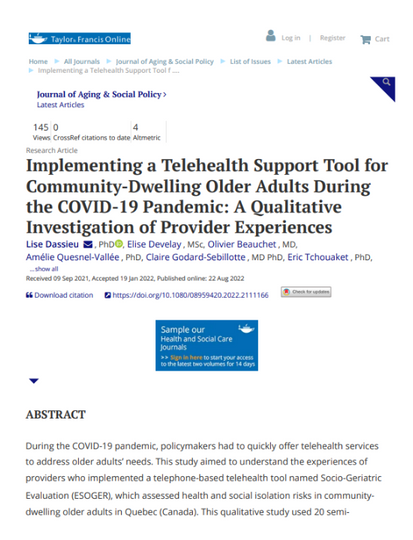Implementing a Telehealth Support Tool for Community-Dwelling Older Adults During the COVID-19 Pandemic: A Qualitative Investigation of Provider Experiences
This qualitative study uncovers three dimensions influencing the implementation of a telehealth tool for older adults: service organization and missions, working conditions, and interactions with clients.
Author: Lise Dassieu, Elise Develay, Olivier Beauchet, Amélie Quesnel-Vallée, Claire Godard-Sebillotte, Eric Tchouaket, Svetlana Puzhko, Sathya Karunananthan, Patrick Archambault, Cyrille Launay, Paul Holyoke, Caroline Sauriol, Kevin Galery & Nadia Sourial
Publication Date: August 22, 2022
Description: During the COVID-19 pandemic, policymakers had to quickly offer telehealth services to address older adults’ needs. This study aimed to understand the experiences of providers who implemented a telephone-based telehealth tool named SocioGeriatric Evaluation (ESOGER), which assessed health and social isolation risks in community-dwelling older adults in Quebec (Canada). This qualitative study used 20 semi-structured online/ phone interviews with health and social service providers coming from publicly-funded healthcare facilities and community organizations. We included adopters and non-adopters of the telehealth tool. Interviews were audio-recorded and transcribed verbatim. We used reflexive thematic analysis to interpret the data. Three dimensions of providers’ practice influenced the tool’s implementation: service organization, working conditions, and interactions with older adults. Participants reported that the tool fostered continuity of care, provided guidance for their pandemic-related new tasks, and helped identify and support socially isolated older adults. Challenges to implementation included limited appropriateness of the telehealth tool for diverse services, feasibility barriers to adopting a new tool amid the health crisis, and acceptability challenges with some older adults. Despite relevance of the telehealth tool for providers, organizational, professional, and interactional barriers could hinder implementation success. Participatory approaches to telehealth may be promising avenues for future policies in this field.
Access: To read this article in full you will need to make a payment or have access to a university database
Keywords: Telehealth, older adults, implementation science, qualitative methods, COVID-19



